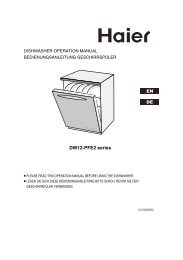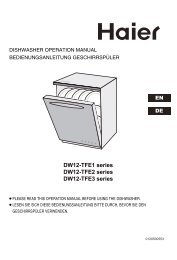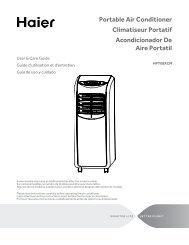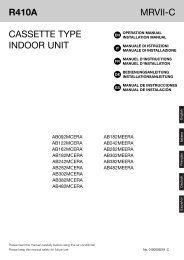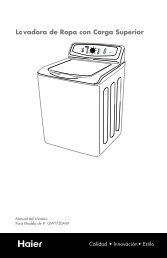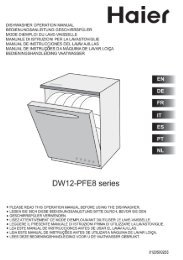Descargar - Haier
Descargar - Haier
Descargar - Haier
You also want an ePaper? Increase the reach of your titles
YUMPU automatically turns print PDFs into web optimized ePapers that Google loves.
Food Storage Information<br />
Fresh Food<br />
• When storing fresh food that is not prepackaged, be sure to wrap or<br />
store food in airtight and moisture-proof material unless otherwise<br />
noted. This will ensure proper shelf life and prevent the transfer of<br />
odors and tastes.<br />
• Wipe containers before storing to avoid needless spills.<br />
• Eggs should be stored in an upright position in their original<br />
carton to maximize shelf life.<br />
• Fruit should be washed and dried, then stored in sealed plastic bags<br />
before storing in the refrigerator.<br />
• Vegetables with skins should be stored in plastic bags or<br />
containers.<br />
• Leafy vegetables should be washed and dried, then stored in<br />
plastic bags or containers.<br />
• Hot food should be allowed to cool before storing in the<br />
refrigerator. This will prevent unnecessary energy use.<br />
• Fresh seafood should be used the same day as purchased.<br />
• When storing meats in the fresh food section, keep in the original<br />
packaging or rewrap as necessary. Follow the suggestions below for<br />
safe storage:<br />
• Chicken 1-2 Days<br />
• Ground Beef 1-2 Days<br />
• Cold Cuts 3-5 Days<br />
• Steaks/Roasts 3-5 Days<br />
• Smoked/Cured Meats 7-10 Days<br />
• All others 1-2 Days<br />
If longer periods of storage are required, store immediately in the freezer<br />
section.<br />
English<br />
12



